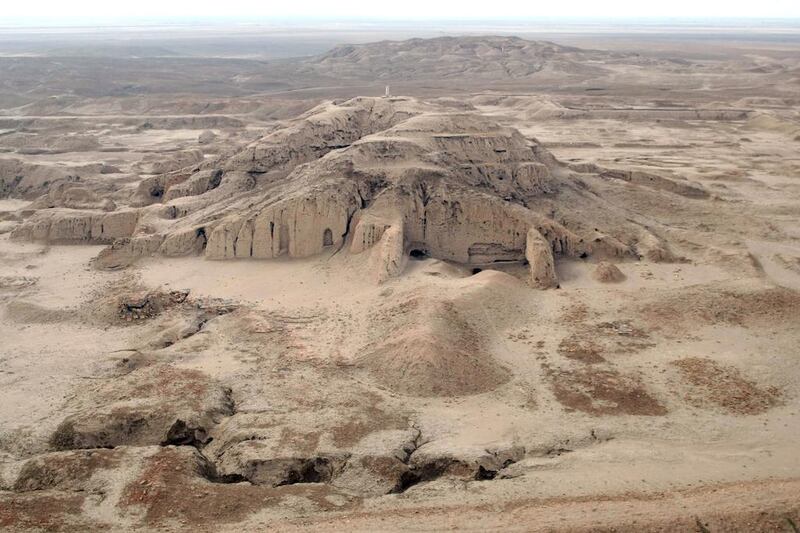Gilgamesh's Snake and Other Poems lifts characters and themes from one of the world's oldest surviving literary works, The Epic of Gilgamesh, pulls them out of time and replants them in a space between ancient Uruk and contemporary Iraq. There is then another replanting, as the Arabic poems of Ghareeb Iskander are brought into English, a co-translation by the author and Scottish poet John Glenday.
The bilingual, facing-page Syracuse University Press edition begins with the title poem. Here, we find a lonely, frozen Gilgamesh in the “empty ruin” of Uruk-Iraq.
The original Gilgamesh was an idealised hero in the epic that bears his name, composed around 2100 BC. Back then, he was a fabled builder and creator. In this collection, he wanders not among his accomplishments, but among silence and destruction.
An earlier translation, also by Glenday and Iskander, was used to narrate a 2013 film-poem by Roxana Vilk. It sets Iskander and Glenday’s words against jerky black and white imagery from contemporary Iraq.
In both cases, the translation is not strictly faithful. In both, Iskander and Glenday discussed the works, rebuilt them and repotted them in English soil. Through this process, the poems were reborn.
In Something Began to Talk, the lines "b jadal al-tabi'a / sabah azraq kal bahr / w layl mudi' kal 'amal" become "The search for truth in Nature / is like daylight, blue as an open sea; / it's like a star-shaken night, shimmering with hope".
Where does "star-shaken" come from, and why has the sea become open? It's easy to attribute this craftwork to Glenday, whose 2009 collection Grain was shortlisted for the Griffin Poetry Prize. But these poems don't read like his other work.
Iskander and Glenday began working on poems together at Reel Festivals, which brought together Scottish and Iraqi poets to translate each other's words. The project culminated in a multilingual collection, This Room is Waiting (2014).
“I think any literary translation should be different from both the source and the target languages,” Iskander said at the time. “A translation is…the third language. It’s the result of the dialogue between the source and target languages.”
Both sides of the book, English and Arabic, shape a poetry that is "enchanted by the laurel of silence". In a section of the Gilgamesh poem, we read an address to al Sid, or "Master": "Long ago you loved the names for things / the rules of grammar and / wordplay. / Today, however, / your only choice is to carry on / so that you may set out for life's second darkness."
For 1,000 years, much of Arabic poetry delighted in rules and wordplay. But Iskander’s poetry is part of a new tradition begun with Adonis and Badr Shakir Al Sayyab, where old rules have been exploded. This collection also doesn’t “write histories for no reason”.
While Iskander’s work calls upon the Gilgamesh epic, this is a new Gilgamesh, who is “alone now. / Snow covers him. / He’s all at sea.” As for the ancient kingdom of Uruk, it is “an empty ruin, / all its people fled. / Such devastation; the streets / shimmer in a caul of silence”.
This is neither the massive, culture-redefining project of a poet like Adonis, nor is it the personal poetry of 90s-generation writers. It is at a juncture of public and private, a history of shared pain. “I will write down the vanished laughter. / This is what I am: / I am the shaman of momentary faith.”
In the other poems: “The Book of Silence,” “The Book of Oblivion,” “The Book of Tears,” and “Labyrinth,” these too are reflections on shared loss. The final short poem ends with a storyteller’s incantatory repetitions, calling the reader in to lay hands on the poems: “You may see embers glowing/ beneath the appearance of cold,/ or you may find tears.”
Gilgamesh's Snake won the 2015 University of Arkansas Award for the Translation of Arabic Literature, which celebrates the vision of Iskander's original work and the freshness of the English translation.
Woven throughout the book is the question of why – and how – one can continue writing in such a broken world. It’s a difficult question in a collection that privileges silence over speech, emptiness over writing. But: “Here’s the answer: / Shine with a light that does not belong to you.”
M Lynx Qualey is is a freelance writer based in Cairo who blogs at arablit.wordpress.com.





